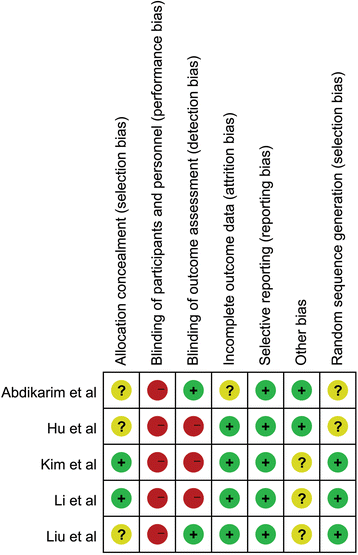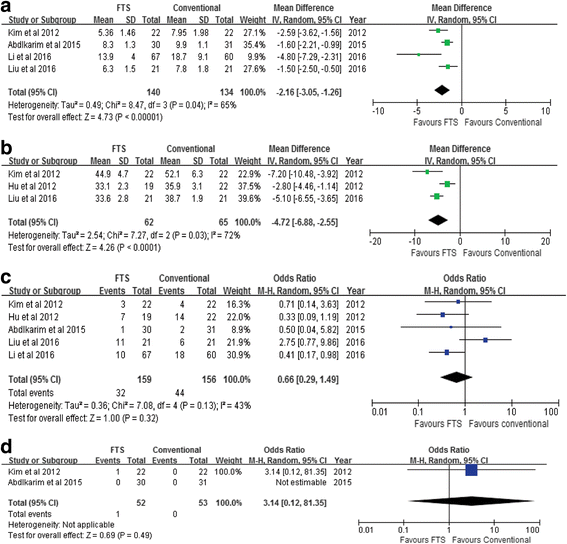Influence of enhanced recovery after surgery programs on laparoscopy-assisted gastrectomy for gastric cancer: a systematic review and meta-analysis of randomized control trials
- PMID: 29169362
- PMCID: PMC5701340
- DOI: 10.1186/s12957-017-1271-8
Influence of enhanced recovery after surgery programs on laparoscopy-assisted gastrectomy for gastric cancer: a systematic review and meta-analysis of randomized control trials
Abstract
Background: This meta-analysis is aimed to evaluate the feasibility and safety of enhanced recovery after surgery (ERAS) programs in gastric cancer patients undergoing laparoscopy-assisted gastrectomy (LAG).
Methods: We performed a meta-analysis of randomized control trials involving either enhanced recovery after surgery (ERAS)/fast track surgery (FTS) for patients underwent LAG. EMBASE, Pubmed, Web of science, and Cochrane Library were searched. Primary outcomes included the length of postoperative hospital stay, cost of hospitalization, postoperative complications, and readmission rate.
Results: Five randomized control trials were eligible for analysis. There were 159 cases in FTS group and 156 cases in conventional care group. Compared with conventional care group, FTS group relates to shorter postoperative hospital stay (WMD - 2.16; 95% CI - 3.05 to - 1.26, P < 0.00001), less cost of hospitalization (WMD - 4.72; 95% CI - 6.88 to - 2.55, P < 0.00001), shorter time to first flatus (WMD - 9.72; 95% CI - 13.75 to - 5.81, P < 0.00001), lower level of C-reaction protein on postoperative days 3 or 4 (WMD - 19.66; 95% CI - 28.98 to - 10.34, P < 0.00001), higher level of albumin on postoperative day 4 (WMD 3.45; 95% CI 2.01 to 4.89, P < 0.00001), and postoperative day 7 (WMD 5.63; 95% CI 1.01 to 10.24, P = 0.02). Regarding postoperative complications, no significant differences were observed between FTS group and conventional care group (OR 0.63, 95% CI 0.37 to 1.09, P = 0.10). The readmission rate of FTS group was comparable to conventional care group (WMD 3.14; 95% CI 0.12 to 81.35, P = 0.49).
Conclusions: Among patients undergoing LAG, FTS is associated with shorter postoperative hospital stay, rapid postoperative recovery, and decreased cost without increasing complications or readmission rate. The combined effects of the two methods could further accelerate clinical recovery of gastric cancer patients.
Keywords: Enhanced recovery after surgery; Fast track surgery; Gastric cancer; Laparoscopy-assisted gastrectomy.
Conflict of interest statement
Ethics approval and consent to participate
All analyses were based on the previous published studies; thus, no ethical approval and patient consent are required.
Consent for publication
All analyses were based on previous published studies; thus, no consent for publication is required.
Competing interests
The authors declare that they have no competing interests.
Publisher’s Note
Springer Nature remains neutral with regard to jurisdictional claims in published maps and institutional affiliations.
Figures




References
Publication types
MeSH terms
Grants and funding
LinkOut - more resources
Full Text Sources
Other Literature Sources
Medical

